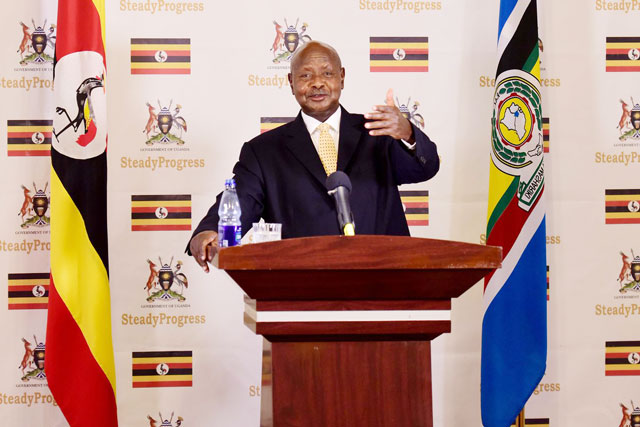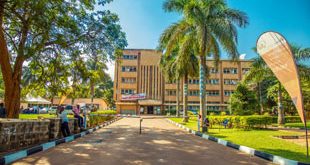
Besigye also pointed at the civil strife in South Sudan resulting from President Salva Kiir’s failure to abide by the constitution and Burundi where President Pierre Nkurunziza’s failure to leave after his term ended has plunged the country in a crisis since 2014.
“To show he is still in charge, Museveni’s only option now is to brutalize people,” Besigye said and cited the Sept.27 incident where Museveni’s Special Forces Command (SFC) soldiers were unleashed on parliament and beat up MPs opposed to lifting the presidential age limit to allow Museveni to contest in 2021. Museveni had been barred by the 75-year age limit. Museveni will be 77 years old then and, since that bar has been scraped from the constitution, he can run again.
Prof. Makara, meanwhile, says political intolerance will increase as more politicking sets in to enable Museveni to extend the term of the presidency from the current five to seven years – the same as was recently passed by MPs for local government leaders and themselves.
“There’s no doubt that many avenues; including slapping charges on those with divergent views, imprisonment, torture and intimidation will be used by the regime,” Makara predicted.
Already, many Museveni opponents are battling court charges for dissenting through social media. Prominent among them is Makerere University-based social researcher Stella Nyanzi who last year was jailed and charged with “cyber harassment” and “offensive communication.”
Democratic Party supporter Moses Mboowa was also imprisoned on charges related to posts he made on Facebook calling on people to attack MPs supporting amendment of presidential age limits.
“Ugandans are becoming angrier,” Makara said.
He says incidents like civil servants being given billions in “presidential handshakes” make them angry. Makara was speaking in reference to the Shs6billion “reward” that the president gave to a group of salaried civil servants for their work on a court case the government reportedly won against a UK oil company; Heritage Oil.
“We also saw MPs being given Shs29million each for consultations to make amendments that were largely unpopular. People’s anger is piling and that shouldn’t be taken for granted,” he said.
Nothing new after all
Makara also said many people feel uncertainty as regards their ownership of property. He was referring to the ongoing Commission of Inquiry into land matters that Museveni ordered because, he said, the government needed the law to change so that government can forcefully takeover land for development in a dispute before compensating its owner. The government proposes to Amend Article 26 of the constitution to allow government to compulsorily acquire private land in this manner.
Towards the end of 2017 Museveni embarked on a nationwide tour to attempt to sell the land law amendment he wants. On radio talk shows and bazaars, Museveni explained that many government projects have stalled because some Project Affected Persons (PAPs) demand exorbitant compensation from the government.
Museveni has been criticized for failing to acknowledge that individuals demanding the exorbitant compensation are either top officials of his government or linked to them. Museveni has also failed to produce either a list of the individuals demanding exorbitant compensation or projects that have stalled over compensation disputes.
Already, the Justice Catherine Bamugemereire chaired land Commission of Inquiry has revealed big wigs in Museveni’s government to be the top land grabbers from poor and weak private owners.
“With the (amended) law in place,” Makara says, “land grabbers will now have a legal cover”.
Generally, however, many observers say 2018 will politically not be any different from previous years. Makara, for example, says Museveni will still use the advantage of numbers in a parliament dominated by members of his NRM party.
The opposition in parliament, headed by Kasese Woman MP and Leader of Opposition Winnie Kizza, will issue but not yield anything significant. Instead, the opposition will sink deeper into internal wrangles.
In the biggest opposition party; FDC, internal wrangling caused by the November Presidential polls that saw ex-legislator Eng. Patrick Amuriat trouncing incumbent party president Gen. Mugisha Muntu, remain.
It is also not clear how Amuriat will steer the party.
Amuriat is a member of the so-called ‘people’s government’ launched by Besigye after losing the 2016 presidential election which he claims he won. Their hallmark is defiance of the Museveni government and, in his campaign; Amuriat repeatedly said “defiance is the only approach that can overthrow the dictatorship.”
If he follows through on his promise, then 2018 will be another year of opposition protests as Besigye and company lurch from one protest issue to another and the government responds with teargas, batons, bullets, and bribes.
He says after the age limit, many think the next thing on agenda for Museveni could be amending article 26 of the constitution which provides for adequate compensation of an individual before their land is acquired by government for either infrastructure development or any other kind of investment.
With the amendments, government wants to be allowed to acquire land even if the parties involved don’t agree. In such an event, the proposal is that government deposits in court or with any competent authority the value of the property as evaluated by the chief government valuer and take possession of land pending determination by court.
 The Independent Uganda: You get the Truth we Pay the Price
The Independent Uganda: You get the Truth we Pay the Price


